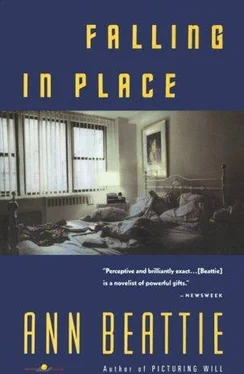Ann Beattie - Falling in Place
Здесь есть возможность читать онлайн «Ann Beattie - Falling in Place» весь текст электронной книги совершенно бесплатно (целиком полную версию без сокращений). В некоторых случаях можно слушать аудио, скачать через торрент в формате fb2 и присутствует краткое содержание. Год выпуска: 1991, Издательство: Vintage, Жанр: Современная проза, на английском языке. Описание произведения, (предисловие) а так же отзывы посетителей доступны на портале библиотеки ЛибКат.
- Название:Falling in Place
- Автор:
- Издательство:Vintage
- Жанр:
- Год:1991
- ISBN:нет данных
- Рейтинг книги:4 / 5. Голосов: 1
-
Избранное:Добавить в избранное
- Отзывы:
-
Ваша оценка:
- 80
- 1
- 2
- 3
- 4
- 5
Falling in Place: краткое содержание, описание и аннотация
Предлагаем к чтению аннотацию, описание, краткое содержание или предисловие (зависит от того, что написал сам автор книги «Falling in Place»). Если вы не нашли необходимую информацию о книге — напишите в комментариях, мы постараемся отыскать её.
Falling in Place — читать онлайн бесплатно полную книгу (весь текст) целиком
Ниже представлен текст книги, разбитый по страницам. Система сохранения места последней прочитанной страницы, позволяет с удобством читать онлайн бесплатно книгу «Falling in Place», без необходимости каждый раз заново искать на чём Вы остановились. Поставьте закладку, и сможете в любой момент перейти на страницу, на которой закончили чтение.
Интервал:
Закладка:
He got out of the shower and threw his sweaty clothes into the hamper, but not before removing the small package, wrapped in paper napkins, from his shirt pocket. He put it on the back of the sink, and reached in the medicine cabinet for adhesive tape and scissors. He cut off the right-size piece and taped it to the dry edge of the sink, then dried himself well and unfolded the napkins. Inside was the duck foot from the Chinese restaurant, gray and curved. He taped the duck foot securely to his penis, then put on his pajamas and went into the bedroom. If she didn’t laugh, it was really all over. It was even more all over than he had thought it could be. He got into bed and she closed the magazine and dropped it on the floor.
“Hot night,” he said.
She was lying on her back, with her eyes closed. She had combed her hair, and her lipstick was gone.
He struggled out of his pajama top. Then the bottoms. She didn’t look. He pulled the sheet over them and took her hand.
He got up on one elbow and kissed her on the forehead. She had no expression on her face, before or after.
“Hey,” he said, moving her hand down his stomach.
“Not on your life,” she said.
He kept moving her hand, until her fingers were touching the duck foot. She yanked her hand away, turned toward him, pulled back the sheet. He held his breath, trying to choke back his laughter. She looked into his eyes.
“Is this what you and the New York girls are into?” she said.

The grotesquely funny was obviously much in vogue. Women wore purple pedal pushers and hacked off their hair with a razor. A put-on. To be ugly is to be funny. To be funny is, maybe, to get through. But did he even realize that the horrible duck foot was a joke directed at himself and his own sexuality? He had changed so much. He would do things more childish than what the children did, and although he didn’t actually harm himself, there was something self-destructive in his shock tactics. A month before — three weeks before, five weeks, it didn’t matter — when there had been so much sun and the blackberry bush bore fruit so early in the summer, he had been picking up sticks in the grass before he mowed it, and she had been planting seeds in the garden. She had looked up to see him clasping his heart in mock-horror, a circular smear of red on his forehead. She had watched him lurch toward her, eyes big, the ugly red smear like a child’s finger-painting, then collapse without a word. He had mashed the blackberries and pretended to be wounded. He had been playing a game with her, but she could not imagine what part he had expected her to take. She had almost wanted to rush toward him — not because she was fooled, but just that if she grabbed him, if she got that close, she might find out something. Or break the tension. Or even laugh with him. But what he had done hadn’t really been that funny. The strangeness of it, the impetuousness with which he had acted, had convinced her that he really did have another life: not the life in Rye, but another life, a real life, a life she didn’t understand anymore. When he finally got up — slowly, like an exhausted person doing a final push-up — he had cocked his head and looked at her, and not wanting to look fazed, she had smiled at him. Just smiled. And then she had gone on sprinkling seeds, evenly, looking to see where they hit the dirt. They were so tiny that of course she couldn’t see. She would see when they came up. She would find out what was going on with John when he left her .
But Mary: What she had done, plucking her eyebrows, hadn’t been done as a joke at all. That was pathetic because it wasn’t an imitation of a joke, like pedal pushers spoofing what had been a genuinely ugly fashion; it was an imitation of what Mary really thought was beauty .
Louise rolled over in bed. She had been so upset because with her eyebrows plucked, Mary’s eyes had looked so large. They had looked so innocent. It had been an innocent gesture to pluck her eyebrows, and harmless, really. Yet when Louise saw Mary’s eyes, it had made her sadder than she had been in a long time. Sadder than she had been when John went through his crazy charade on the lawn. As much as John wanted to be a child, Mary had wanted to be a grownup, and that was even more pathetic .
Nine

DID PEOPLE ever walk into a high school, however different it might be from where they had gone to high school, and not feel, by the sight and smell of it, somehow transported through time, back to their own school?
The lockers at Mary’s school were gray metal, with built-in locks. The lockers at his school, which he would not have believed he remembered, he could envision in exact detail. They had been green metal, with padlocks, and they had had vents in the top. All that had been trapped in there had been books, yet there had been vents in the doors — a half-gesture at letting something breathe.
He was surprised that he felt nervous, that he didn’t feel on top of things, ready to talk as one adult to another. He felt like a child again. A crazy image flashed through his mind of himself, slamming a handball against the wall at the far end of the hall, slamming it and slamming it until he was caught and punished.
He took the small folded piece of paper out of his pocket. The teacher’s name was Cynthia Forrest. He had not planned what he was going to say to Cynthia Forrest. He thought that perhaps his stomach felt funny because he was hungry and hadn’t eaten, or because he had wanted to talk to Nina on the phone and he couldn’t get her. He had called Lord and Taylor’s and they had tried to connect him, but no one picked up the phone. He sent her a message, squeezing his eyes shut and making a wish: Me, Nina. Pick it up. Not some lady wanting to order stockings with gold flecks in them. Me. In Connecticut. Answer.
He walked into the classroom. He had passed only three students in the corridors — none of them kids he knew — and he hated empty places. He still hated to be the only person walking up a flight of stairs, the first person in line. Behind him, it seemed as though wind might rush in.
“You’re Mary’s father,” she said, getting up from her desk and putting out her hand. Her hand was light, and shaking it disturbed him. He didn’t know why. He smiled at her. His eye was drawn to her desk — the same sort of desk his teachers had had, the color of dry leaves, with nicks and scratches. Were there any desks with nice wood in schoolrooms?
“Please sit down,” she said.
He sat on one of the low desks with an inkwell. Used now for gum, of course. To hide notes, as if in the hole of a tree. He wiggled his thumb in the inkwell and felt better when his finger rested on a bump of dried gum. If you knew some of the inevitables, it kept you on top of things. Nick’s philosophy: Know as much as you can, because one tiny thing might help you. Nick knew how to tie fifteen kinds of knots.
“What can I tell you?” Cynthia said.
“I’m here because my wife and I are worried about Mary’s doing poorly in summer school. It was quite a shock that she failed English to begin with, and my wife says she isn’t doing much better now.”
Cynthia nodded and didn’t say anything.
“Why?” he said.
“Why?” Cynthia said. “One reason?”
She did not say it unkindly, but he was taken aback. He felt as ridiculous, as out of control, as he had thought he would a few minutes ago when he was walking down the hallway, reminding himself that he was one adult who would be talking to another adult.
Читать дальшеИнтервал:
Закладка:
Похожие книги на «Falling in Place»
Представляем Вашему вниманию похожие книги на «Falling in Place» списком для выбора. Мы отобрали схожую по названию и смыслу литературу в надежде предоставить читателям больше вариантов отыскать новые, интересные, ещё непрочитанные произведения.
Обсуждение, отзывы о книге «Falling in Place» и просто собственные мнения читателей. Оставьте ваши комментарии, напишите, что Вы думаете о произведении, его смысле или главных героях. Укажите что конкретно понравилось, а что нет, и почему Вы так считаете.












